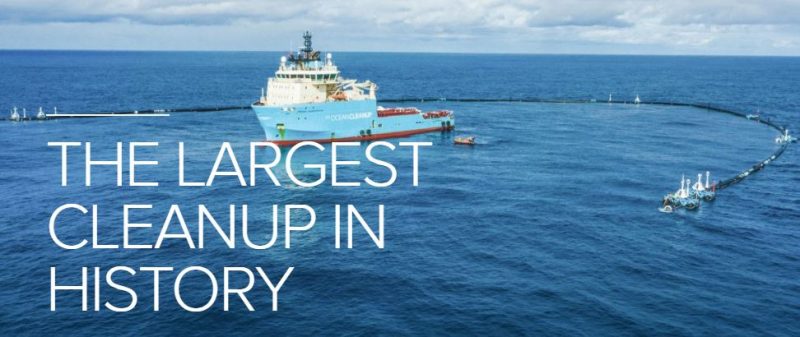

Still Waiting
When it was launched last year, one could sense that it was an idea that people wanted to believe in. Amidst all the depressing news of plastics inundating the world’s oceans, with news almost every day of washed-up whales and dolphins full of plastic in their stomachs, the Ocean Cleanup provided hope of a push back against the plastic tide. At the time of its launch, the great pacific garbage patch, which was the target of the cleanup, was estimated to contain 1.8 trillion pieces of plastic waste weighing an estimated 80,000 tonnes.
With an aim to eventually remove 90 percent of plastic waste from the world’s oceans using giant U-shaped floating rigs by early last year, the Ocean Cleanup Foundation had raised close to USD 32 million in funding from various sources. Its sponsors include storied names such as Salesforce.com chief executive Marc Benioff, philanthropist Peter Thiel, Julius Baer Foundation and Royal DSM.
Boyan Slat – now the founder and CEO of The Ocean Cleanup – had first proposed the cleanup project in 2013 and the device was shortlisted for the 2015 Design of the Year award.
Early this year, the project faced its first major setback when a fracture developed in the device nicknamed ‘Wilson’. That forced an abort of the mission forcing the setup to be towed back to Hawaii for repairs.
In addition to the structural failure of its tubular plastic boom, the operators also discovered that the slow movement of the collecting rig led to some items it collects floating back out into the open sea. Not exactly the best way to achieve its target of cleaning 50 percent of the pacific garbage patch in 5 years.
“For the system to effectively retain plastic, it must consistently travel faster than the plastic,” The Ocean Cleanup stated. “In other words, it must go faster.”
Thanks to all the media coverage and hype it received on the predictable template of a very young founder, a global problem and a solution with a massive promise, many detractors accuse the Ocean Clean up of taking attention from other, much more practical solutions to the problem.
With a new version launched mid-year in 2019, it remains to be seen how far The Ocean Clean Up goes towards providing a solution that can be replicated elsewhere. But six years after Boyan Slat first proposed the solution, its a sobering thought about how tough the problem is, and the importance of not looking for quick fixes, but deeper into solutions that use a combination of other aspects like behavioural change (use of plastic), control at source (don’t allow plastic to reach the oceans) and of course, alternative ways to clean up.
On the regular updates that The Ocean Cleanup provides on its website, a conspicuous absentee is the actual amount of plastic they have recovered so far.
The firm has a declared ambition to launch System 002, followed by the scale-up to the full fleet in the Great Pacific Garbage Patch. With a subsequent expansion of the cleanup operation to the remaining four ocean garbage patches.
One year down, even their biggest fans are probably not holding their breath. In a way that could be a good thing. System 002 could do with less hype and more results. After all, the animals are still washing up ashore, the plastic is still pouring in, and going by media reports, at last, we haven’t seen a more promising solution yet.
1. The mandate for blending Compressed Biogas (CBG) with natural gas has come into effect…
Andhra Pradesh is striving towards greening its energy sector with quite some speed. In a…
With an objective to bolster India’s green energy goals, a Tripartite Agreement has been signed…
The Union MNRE Minister Pralhad Joshi launched the Green Hydrogen Certification Scheme of India (GHCI)…
India’s energy conglomerate Bharat Petroleum Corporation Limited (BPCL) has commissioned a 5MW green hydrogen plant…
In a historical development, the European Space Agency (ESA) has successfully launched its pioneering ‘Biomass’…